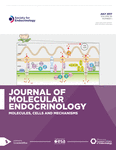Revising the role of the androgen receptor in breast cancer
- 1Androgen Signalling Laboratory, Department of Surgery and Cancer, Imperial College London, London W12 0NN, UK
2Molecular Oncology, School of Biological Sciences, University of Essex, Colchester, Essex CO4 3SQ, UK
- Correspondence should be addressed to G N Brooke; Email: gbrooke{at}essex.ac.uk
Abstract
Breast cancer (BC) is traditionally viewed as an oestrogen-dependent disease in which the androgen receptor (AR) is inhibitory, counteracting the oncogenic activity of oestrogen receptor α (ERα (ESR1)). Most probably as a result of this crosstalk, the AR has prognostic value in ER-positive disease, with AR positivity reported to correlate with a better prognosis. Activation of the AR pathway has been previously used as a therapeutic strategy to treat BC, but its usage declined following the introduction of the anti-oestrogen tamoxifen. More recently, it has been demonstrated that a subset of triple-negative BCs (molecular apocrine) are dependent upon androgen signalling for growth and therapies that inhibit androgen signalling, currently used for the treatment of prostate cancer, e.g. the antiandrogen bicalutamide and the CYP17 inhibitor abiraterone acetate are undergoing clinical trials to investigate their efficacy in this BC subtype. This review summarises the current knowledge of AR activity in BC.
- Revision received 11 April 2014
- Accepted 16 April 2014
- Made available online as an Accepted Preprint 16 April 2014
- © 2014 Society for Endocrinology











